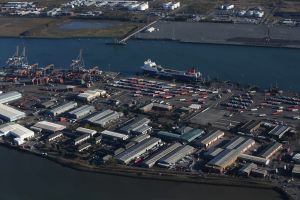Archives
Feature, Freight News, Sea
Belfast tops 24m tonnes again
[ February 5, 2020 // Chris ]Tonnage through Belfast Harbour during 2019 remained strong at over 24 million tonnes for the second year running.
Ro-ro units rose by 4% to a record 542,000, almost all of it on Stena Line’s routes to Scotland and England. Exports of stone by Co Down based Conexpo for GB and European infrastructure projects exceeded a million tonnes for the first time while tonnages in the wider aggregates sector grew by 4% to a record 1.6m tonnes.
Container traffic increased by 2%, surpassing the 130,000 units handled threshold for the first time since 2008.
The main decrease was in lower imports of grain, animal feeds and fuels, thanks to the year’s more favourable weather led to lower imports of grain, animal feeds and fuels. Large volumes of grain had to be imported in 2018 as the poor weather hit local harvests.
Belfast Harbour chief executive, Joe O’Neill, said: “Although there has been prolonged uncertainty about Brexit’s implications for Northern Ireland, port-related trading activity within the local economy has been steady with tonnage levels staying above 24m tonnes for the second consecutive year. This reflects Belfast Harbour’s highly diversified and resilient business model which enables us to operate across every major cargo sector.”
He added: “Belfast Harbour’s long-term strategy is to be the world’s best regional port. That will require significant ongoing investment in infrastructure to deliver projects in partnership with key customers such as Stena Line and also attract new trades to Belfast. To that end, we are currently investing £55m to upgrade the Belfast–Liverpool ferry terminal to facilitate two new leading-edge vessels which Stena is introducing and are purchasing ten new cranes at the port’s container terminal to improve the efficiency of container handling.”
Port director Michael Robinson, said: “Over the longer-term, the mix of trades handled by the port will continue to evolve as consumer spending habits change and the drive to decarbonise the economy accelerates. While this will lead to a decline in fossil fuel imports which have been a staple of the port industry for the last century, it also presents opportunities to further develop trades related to the green economy and sectors such as offshore wind where Belfast Harbour has a proven track record.
“By investing in facilities that cater for the next-generation of larger and more efficient vessels we can provide economies of scale for existing importers and exporters and attract new business to Belfast.”
Tags: Belfast Harbour















